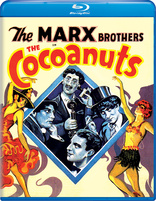The Cocoanuts Blu-ray Movie
HomeThe Cocoanuts Blu-ray Movie 
Universal Studios | 1929 | 93 min | Not rated | Nov 07, 2023Movie rating
6.7 | / 10 |
Blu-ray rating
| Users | 0.0 | |
| Reviewer | 3.0 | |
| Overall | 3.0 |
Overview
The Cocoanuts (1929)
During the Florida land boom, the Marx brothers run a hotel, auction off some land, thwart a jewel robbery, and generally act like themselves.
Starring: The Marx Brothers, Groucho Marx, Groucho Marx, Harpo Marx, Chico MarxDirector: Robert Florey, Joseph Santley
| Comedy | 100% |
Specifications
Video
Video codec: MPEG-4 AVC
Video resolution: 1080p
Aspect ratio: 1.33:1
Original aspect ratio: 1.2:1
Audio
English: DTS-HD Master Audio 2.0
Subtitles
English SDH, French
Discs
Blu-ray Disc
Single disc (1 BD)
Playback
Region A (B, C untested)
Review
Rating summary
| Movie | 3.5 | |
| Video | 3.0 | |
| Audio | 3.0 | |
| Extras | 2.0 | |
| Overall | 3.0 |
The Cocoanuts Blu-ray Movie Review
Reviewed by Jeffrey Kauffman October 16, 2016Note: This film is available as part of The Marx Brothers Silver Screen Collection.
The Marx Brothers remain one of the most iconic comedy teams in the entire history of show business, including of course their film work. Years of
vaudeville experience and then Broadway stardom meant the siblings came to cinema with personas largely set and with a huge “catalog” of bits they
could utilize for their film work. That said, the movie going public had never really seen anything like the manic proclivities of this familial troupe, and
countless commentators from 1929 (when The Cocoanuts debuted on celluloid) on have attempted to analyze various elements of the
team’s completely unique comedy. While perhaps not especially “meaningful” in any overarching way, I had an unusual response to watching these
new transfers of the first five Marx Brothers feature films (all reportedly sourced from new 4K restorations done by Universal), one probably sparked
by my recent reviewing duties.
Arrow Video’s UK branch recently released
Woody Allen: Six Films 1971-1978, and in doing some background reading in preparation for my reviews of the movies in that set,
more than once I read in various articles comments along the lines of “Allen helped to define Jewish humor” or “Jewish humor simply wouldn’t be
the
same without Allen.” Allen’s patented brand of neurosis, sexual obsession and verbal acuity may indeed be at least a trifecta of Jewish
humor if not the trifecta, but one only need look a bit further back in time to the Marx Brothers for another potent example of the
“mainstreaming” of elements that could well be considered Jewish humor. I'm not suggesting this is the only way to look at the Marx Brothers'
efforts, or even that it's an "important" way, just that it struck me as "being there" for me after having just watched a bunch of Allen films.
In a way, though, the Marx Brothers’ perceived “Jewishness” is a little
more subliminal than Allen’s is in his own films, though for those with the eyes to see, the siblings represent their generation of Jews rather
iconically.
Not only is their verbal humor full of puns and other formalistic hijinks, the very subject matter of many of their jokes tends to focus on social,
political and even economic elements. The very fact that the act is comprised of family is important, with a “me and you against the world”
ambience
that speaks to outcasts (obviously including Jews) to this day. But there’s a “subtext” to many of the early Marx Brothers films, where the
brothers
are the outsiders, virtual interlopers attempting to make sense of a calamitous “new” world, whether that be a hotel, high society, a passenger
ship,
college sports or even a supposed nation in the throes of financial ruin.
What’s fascinating about the early Marx Brothers efforts is how they very
subtly display signs of the assimilative fervor that many first or second generation Jews of that time period experienced, where it became
paramount
(no pun intended, considering the studio which released the early Marx Brothers efforts) to “blend in”. That may seem positively non-intuitive,
given
the Marx Brothers’ predilection toward anarchic behavior and just outright silliness, but when seen through the prism of an early to mid 20th
century
“Jewish identity,” the first five Marx Brothers feature films offer not just laughs galore, but a rather interesting example of so-called “ethnics”
rather
brilliantly invading the American consciousness in an almost subversive way. In this respect, the Marx Brothers become one of the most potent
examples
of what might be termed cultural immigration, where their Jewishness may have been slightly cloaked but no less ingratiating in the long run.
That
“cloaking” may be nowhere more obvious than in the persona of Chico, a Marx who spoke with a faux Italian accent and who seemed to be
something of a grifter at times. Cloaked in another way but perhaps arguably more ostensibly Jewish, at least on one interpretive level, was Harpo,
the weirdly childlike mute who seemed
to
often be the hapless scapegoat in many of the films, the outsider whose very powerlessness (as evidenced by his inability or unwillingness to
speak)
created “problems,” albeit often in a comedic way. The most obvious paradigm of Jewishness is of course Groucho, with his hyperarticulate
verbal
humor and a probably more than slightly lecherous mien which may in fact be a precursor for some of Woody Allen’s more sexually charged
material.
Zeppo, the kind of “forgotten” Marx Brother, and the one whose film persona is probably the blandest, may therefore somewhat ironically be seen as
the best symbol of those
aforementioned assimilative tendences—Zeppo had “learned” how to be an American first, blending in as the troupe’s straight man and therefore
almost seeming like an outsider himself, at least within the insular world of the siblings’ relationships.
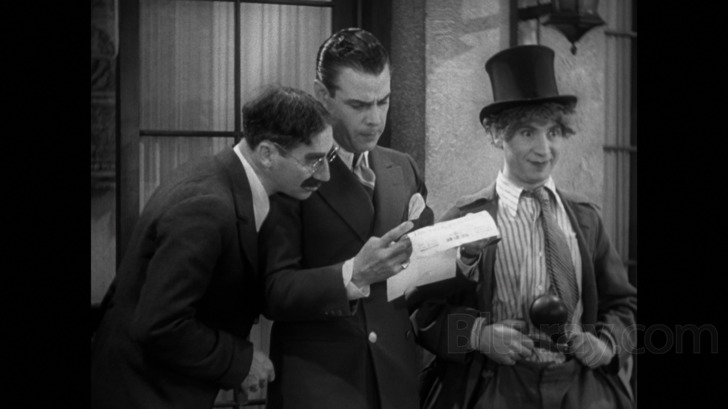
Both The Cocoanuts and the next Marx Brothers film, Animal Crackers, were based on Broadway extravaganzas the brothers had starred in, both having been written by two more Jews who were introducing elements of their cultural humor into the American mainstream, George S. Kaufman and Morrie Ryskind. It’s notable that The Cocoanuts was advertised as an “all talking, all singing musical hit”, a sign that this film arrived in what was still the early days of sound motion pictures. In that regard (and as commentator Anthony Slide mentions in the supplement to this film), it’s also interesting to note that director Robert Florey attempts at least to counteract the early talkie tendency to just plop a camera down and let the action unfold with no further ado. As manic as the Marx Brothers are in this film, the camera itself is surprisingly febrile at times, at least within the confines of a film shot (evidently quite quickly) in 1929.
There is a plot in The Cocoanuts, but it’s really only a framework for bits the brothers had honed through years of vaudeville and other stage work. Groucho is on hand as Mr. Hammer, the strapped for cash owner of the Hotel de Cocoanut. Mr. Hammer is facing a mutiny on the part of his bell staff since he has no funds with which to pay them, but all is solved in a song and dance routine. If Mr. Hammer is conning his employees, a number of new guests or at least visitors seem to have other grifts on their minds. Chico and Harpo show up and seem to be scheming to rob other denizens of the hotel, but they’ll have to get in line to do so. Also on hand are much more clearly criminally inclined people like Harvey Yates (Cyril Ring) and his acolyte Penelope (Kay Francis). Providing her typically matronly comedy relief is Margaret Dumont as a doyenne named Mrs. Potter, whose daughter Polly (Mary Eaton) provides what is the ostensibly romantic content of the film (as is noted in both the commentary track on this film and the documentary which is included on the Duck Soup disc, it's notable that the film's big windup ends on lovers Eaton and Oscar Shaw rather than the brothers themselves, as if to reassure audiences they were in fact seeing a "typical" Hollywood film).
As undeniably innovative and anarchic as the comedy is in The Cocoanuts, there’s still a slight feeling of round pegs being forced into square holes at times, as evidenced by that aforementioned “reassuring” final shot in the film. Copious anecdotal evidence suggests The Cocoanuts was shot extremely quickly without the safety net of many retakes, and therefore a number of small but telling stumbles accrue both in line readings as well as occasionally even in blocking (you can see how various brothers occasionally slightly drift out of frame at times, not staying on their “marks”). Still, this was an astounding feature film debut for the brothers, and the film remains hugely enjoyable despite its quainter proclivities.
The Cocoanuts Blu-ray Movie, Video Quality 
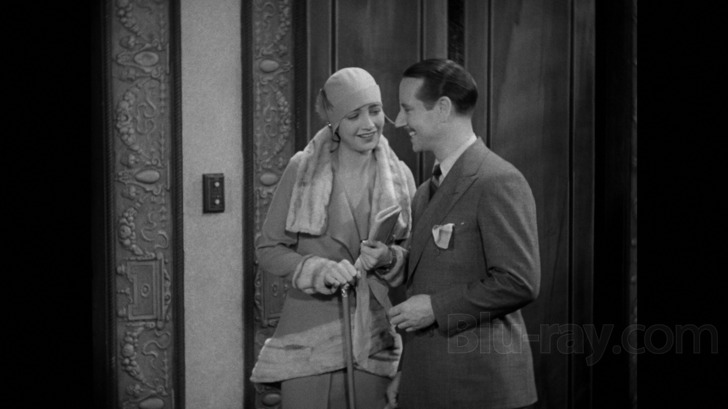
The Cocoanuts is presented on Blu-ray courtesy of Universal Films with an AVC encoded 1080p transfer in 1.33:1 (the credits sequence is slightly pillarboxed—see screenshot 20). This is by far the most heterogeneous presentation in the Marx Brothers set, one which varies from very good to pretty rough looking, at several junctures mid-scene for reasons which at times defy logic (i.e., why would a snippet here or there in an intact sequence need to be sourced from a different, and often substandard, element?). Even Anthony Slide's commentary only really touches on this disparity once, in a fairly late downturn in quality which he ascribes to the fact that that particular snippet was removed from the film at one point and had to be recobbled from a secondary source. But this presentation veers back and forth at several points. The first noticeable downturn in quality is at circa 9:27, for the "When My Dreams Come True" sequence, where things become quite a bit grittier and less clear. That said, close-ups of Mary Eaton still clearly show fine detail like flyaway hair (see screenshot 10). Things revert to the better look of this transfer at around 15:26, but devolve again around 27:19, a ragged section which lasts until around 38:39. By far the worst part of this transfer is later in the film, starting at 49:51, where things are ragged enough that I have to wonder if they might have even been sourced from a blown up 16mm source (see screenshot 5). Detail is negligible here and contrast is wonky enough that facial details more or less disappear in the wide shots. A couple of later moments, including one at around 1:08:01, literally in the middle of the jail scene, and a very late moment at 1:27:10, again show markedly less detail and a much coarser grain field. All of this said, when The Cocoanuts looks good, it looks very good, with solid contrast, appealingly deep black levels and nicely gradated gray scale. As with many early talkies, there aren't a ton of close-ups, and so superb levels of fine detail are rarely if ever on display. The inconsistency of this transfer may cause some to feel a 3.0 score is too generous, while others may feel 3.0 is too low, given the challenges Universal evidently faced in cobbling together a complete version of the film, but I'll further complicate matters by saying my "actual" score is 3.25. The bottom line is those who have suffered through pretty shoddy previous home video releases of this film will probably be pleasantly surprised at the general upgrade in quality here, while those who have never seen The Cocoanuts previously would be well cautioned to set their expectations appropriately.
The Cocoanuts Blu-ray Movie, Audio Quality 
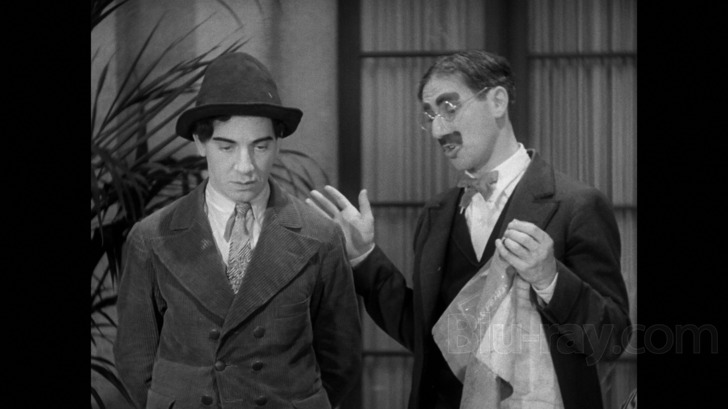
While not as badly damaged as parts of The Cocoanuts' video presentation is, the DTS-HD Master Audio 2.0 mono track on this release is the least effective and convincing of the five films in the Marx Brothers set. The first two films were shot on the east coast and have long been seen (heard?) as the shoddiest in terms of overall audio quality, and that apprehension will probably not be significantly changed by this Blu-ray presentation. While mitigated from earlier home video releases, hiss is still more than abundant, and while also attended to by restorative efforts, there are still occasional pops and cracks to be heard. All of this said, dialogue is rendered generally clearly, at least within the boxy, sometimes clipped, confines of early talkie recording technology.
The Cocoanuts Blu-ray Movie, Special Features and Extras 
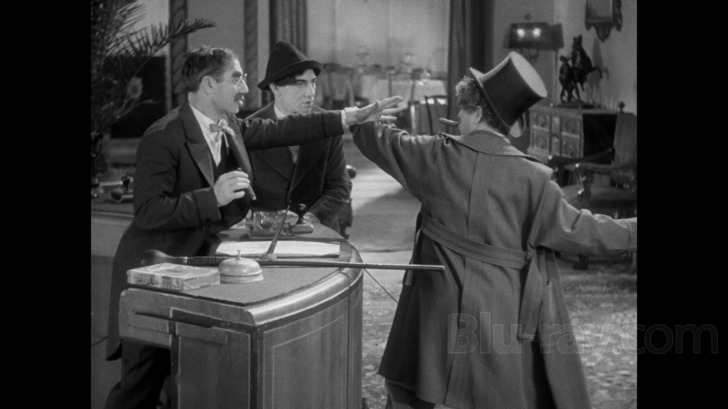
- Feature Commentary with Film Scholar Anthony Slide. Slide delivers a nicely informative commentary, one that deals with biographical elements while also providing some good anecdotal vignettes about the shoot.
The Cocoanuts Blu-ray Movie, Overall Score and Recommendation 
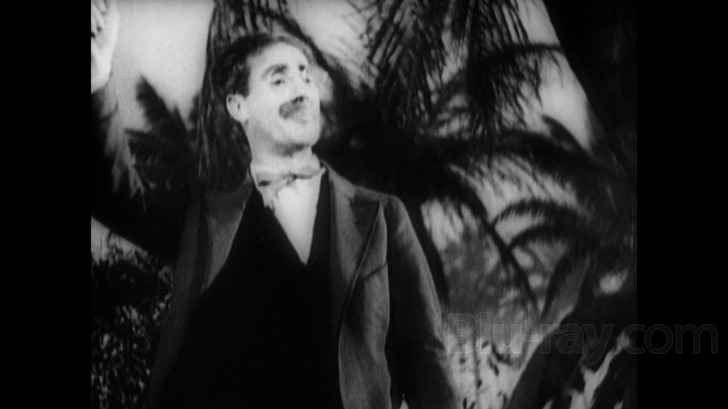
The Cocoanuts preserves one of The Marx Brothers' Broadway triumphs, but it struggles at times to really work as a film, something that its early talkie status probably only exacerbates. The brothers are often hilarious, but the film is a bit more uneven than the later Paramount features. Video is improved from earlier releases but still pretty problematic at times, and audio also isn't able to completely overcome the recording technologies of its era and intervening damage. Still, this is a wonderful, hilarious motion picture, and this new Blu-ray release comes Highly recommended.
Similar titles
Similar titles you might also like

Monkey Business
1931

Animal Crackers
1930

Horse Feathers
1932

Duck Soup
1933

I Don't Want to Be a Man
Ich möchte kein Mann sein
1918

Safety Last!
1923

The Saphead
Ultimate Edition
1920

One, Two, Three
Special Edition
1961

Three Ages
1923

Goin' to Town
1935

Champagne
1928

The Extra Girl
1923

I'm So Excited!
Los amantes pasajeros
2013

Speedy
1928

Buster Keaton: The Shorts Collection 1917-1923
1917-1923

The Count
1916

The Fireman
1916

Behind the Screen
1916

The Cure
1917

The Pawnshop
1916
